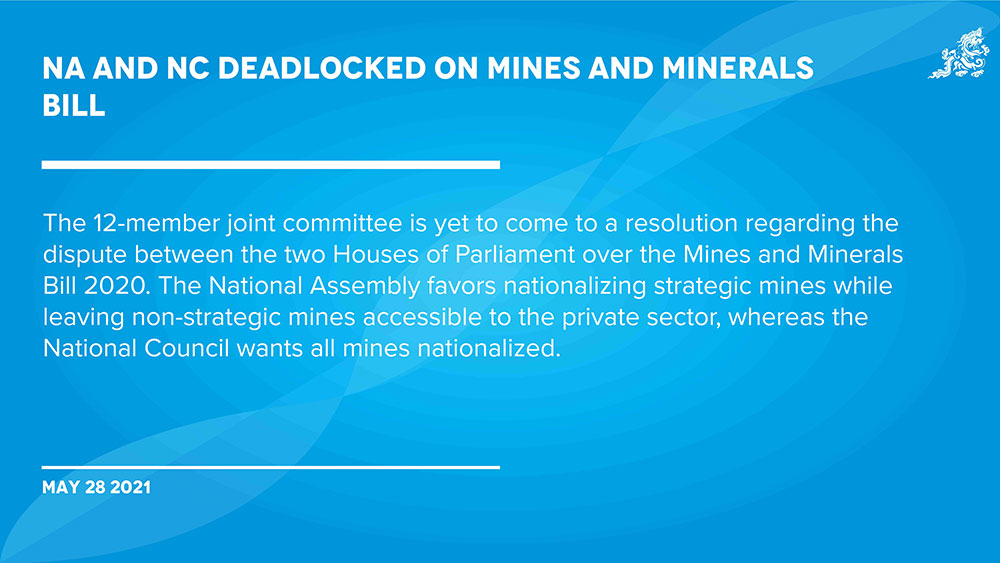Efforts from the 12-member joint committee on the disputed Mines and Minerals Bill 2020 to resolve the differences between the two Houses of Parliament have been fruitless, as each side remain firm on their stands.
The National Assembly is in favour of nationalisation of strategic mines and leaving non-strategic mines open to the private sector while the National Council is pushing for nationalisation of all mines.
At the pre-session press conference on May 25, the NC’s eminent member Phuntsho Rapten said that unlike in the case of other Bills, the two Houses have not been able to agree on principles of the Bill.
“If you look at other Bills, disagreements pertain to certain disputed clauses only, but the whole Mines and Minerals Bill is disputed,” Phuntsho Rapten said.
The joint committee, the eminent member said, had been trying to find some common understandings but without much success.
“We haven’t been able to arrive at a consensus mainly because we are not able to agree on principle issues, which are important. If we can’t agree on the principle issues, there is no way we can move forward,” he said.
However, Phuntsho Rapten added that the discussion was still ongoing.
Citing the Legislative Rules of Procedure (LRoP), he said that the joint committee must reach a consensus or try to come up with recommendations that are mutually agreeable to both Houses.
“When both Houses are at loggerheads on the principle issues, the joint committee is not in a position to move forward,” he said.
The joint committee recently went to Paro for a five-day meeting to resolve the differences between the two Houses. National Assembly members said that they could not convince the NC members on the formers’ stand.
It was learnt that the joint committee members from the NC were convinced to some extent at the Paro meeting but they changed their mind after reaching Thimphu.
The joint committee includes Athang Thedtsho MP Kinley Wangchuk (chairperson), the NC member from Pemagatshel, Choining Dorji, Eminent Member Phuntsho Rapten and Samtse’s Phuntshopelri MP Ganesh Ghimiray.
Chairperson of the joint committee refused to comment on the issue citing the committee’s rules.
MP Ugyen Dorji, who is not a member of the joint committee, said that he stood with the National Assembly’s stand, as he did not believe in total nationalisation of mines.
He said that it was important for the government to keep non-strategic mines open to the private sector for development of the private sector.
The Bill seeks to repeal the Mines and Minerals Management Act 1995, which the Houses believes is outdated to cover the current issues.
The government hopes to streamline policies related to mines and minerals with the enactment a new Mines and Minerals Act.
Parliament has made efforts in such a way that the Bill will benefit the local community in terms of employment opportunities, business, education and health. Observers say that under the prevailing system the local community was not able to benefit much from the mining and minerals sector.
The State Mining Corporation Limited (SMCL) has taken over all gypsum, dolomite and coal mines in the country, as the government did not renew the lease of private operators. Jigme Mining Limited is the latest to come under the portfolio of SMCL after the expiry of its lease period.
Only quarries that produce construction materials are operated by private companies today.
In an earlier interview, economic affairs minister Loknath Sharma said that non-strategic mines could be allocated to private individuals if the new Act makes such a provision. He said that it would be difficult to predict the outcome of deliberations on the Bill.
According to officials, there are plans to implement the new mining Act six months after its adoption.
By MB Subba
Edited by Tashi Dema


